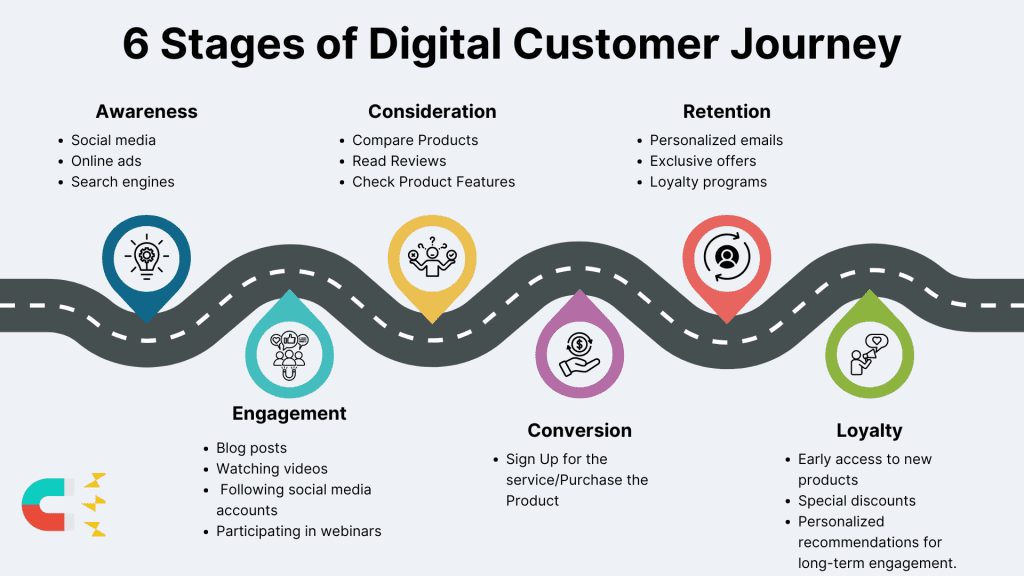Every time someone interacts with your brand online, it’s part of their journey. The goal? To turn those curious clickers into loyal fans


Imagine you’re scrolling through social media, minding your own business, when BAM! An ad pops up that solves a problem you have. Intrigued, you click.
Touchpoint: Social media ad.
Welcome to the wonderful world of your digital customer journey! Every time someone interacts with your brand online, it’s part of this journey. The goal? To turn those curious clickers into loyal fans. Here’s how to map your path to success:
A customer journey is the full experience a customer has with a brand, from first discovering it to becoming a loyal advocate.
Key Stages:


Awareness is the first step in the digital customer journey. This is where you grab someone’s attention. This stage is all about making potential customers aware of your brand. The goal is to catch their eye and spark interest.
A social media ad you saw, or a friend raving about your product.
Social Media Presence
Use platforms like Instagram, Facebook, and LinkedIn to reach your target audience. Share engaging content, participate in conversations, and use targeted ads.
Search Engine Optimization (SEO)
Make sure your website shows up in search engine results. Use relevant keywords, create valuable content, and ensure your site’s performance is top-notch.
Online Advertising
Invest in pay-per-click (PPC) ads, display ads, and social media ads to increase visibility.
Example: A skincare brand creates an eye-catching Instagram campaign showcasing before-and-after photos of satisfied customers, utilizing hashtags and influencer partnerships to broaden reach.
So, they clicked your ad (yay!). Now you need to keep them interested. Imagine a user-friendly website with clear navigation and cool visuals.
Website, Social Media Page. Think easy-to-find information and content that actually makes them want to learn more.
Content Marketing
Share blog posts, videos, infographics, and other content that addresses your audience’s interests and needs.
Social Media Interaction
Respond to comments, participate in discussions, and create interactive content like polls and quizzes.
Email Marketing
Send personalized emails with valuable content, special offers, and updates.
Example: An online fitness coach regularly posts workout videos on YouTube, writes blog posts on nutrition, and engages with followers on social media by answering questions and sharing tips.
During the consideration stage of the digital customer journey, potential customers are evaluating their options. They compare products or services, read reviews, and seek recommendations. Your goal is to provide value and build trust.
Informative content. Make sure your product info is clear and easy to understand. Real customer reviews can be a big help too!
Customer Reviews and Testimonials
Showcase positive reviews and testimonials on your website and social media.
Detailed Product Information
Provide comprehensive product descriptions, specs, and high-quality images.
Comparisons and Case Studies
Offer comparison guides and case studies to help potential customers make informed decisions.
Example: A software company highlights customer success stories on its website, provides detailed product comparisons, and offers free trials to demonstrate value.
Conversion is the stage where potential customers take action, such as making a purchase or signing up for a service. The goal is to make this process as smooth and straightforward as possible.
Secure checkout process. No one likes a clunky checkout. Keep it simple and secure to get them from "considering" to "converted" with a smile.
User-Friendly Website
Ensure your website is easy to navigate, mobile-friendly, and fast-loading.
Clear Calls-to-Action (CTAs)
Use compelling CTAs to guide users towards the desired action.
Secure and Simple Checkout Process
Simplify the checkout process, offer multiple payment options, and ensure security.
Example: An e-commerce site offers a streamlined checkout process with guest checkout options, multiple payment methods, and clear CTAs like “Buy Now” and “Add to Cart.”
The sale is done, but the journey isn’t over! Post-purchase emails with helpful tips, loyalty programs with awesome rewards, and personalized recommendations all help keep them happy.
Post-purchase communication and loyalty programs. Show them you care about them even after they buy something.
Personalized Follow-Ups: Send personalized thank-you emails, product recommendations, and special offers.
Customer Support: Provide excellent customer support through various channels, including chat, email, and phone.
Loyalty Programs: Implement loyalty programs that reward repeat customers with points, discounts, and exclusive offers.
Example: A subscription box service sends personalized emails with product recommendations based on past purchases, offers 24/7 customer support, and rewards loyal customers with points they can redeem for discounts.
Loyalty is the final stage of the digital customer journey. It involves cultivating long-term relationships with customers and turning them into brand advocates.
Social media engagement and online communities. They're singing your praises on social media, recommending you to everyone they know, and maybe even joining your online community.
Exclusive Access and Offers: Give loyal customers early access to new products, exclusive deals, and special events.
Engagement Campaigns: Create campaigns that encourage customers to share their experiences on social media and refer friends.
Continuous Improvement: Seek feedback and continuously improve your products and services based on customer insights.
Example: A fashion brand offers a VIP program that gives members early access to sales, exclusive discounts, and invitations to special events, encouraging them to remain loyal and spread the word.
Mastering the digital customer experience involves understanding and optimizing each stage of the journey. From capturing attention in the awareness stage to fostering long-term loyalty, every interaction matters. By focusing on these key stages—Awareness, Engagement, Consideration, Conversion, Retention, and Loyalty—you can create a seamless, personalized experience that turns casual browsers into dedicated brand advocates. Remember, the digital landscape is ever-evolving, so stay agile, listen to your customers, and continuously adapt to meet their needs.
Try Eclipse AI to better understand your Customers
Don’t Let Your Competitors Understand Your Customers Better Than You
Don’t miss out. Try our 30-day Free Professional Trial.

